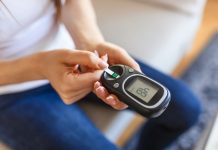
Researchers at the University of Manchester have found that an NHS behavior-change program can significantly decrease the risk of developing type 2 diabetes in adults with elevated blood sugar levels.
The NHS Healthier You Diabetes Prevention Program (NDPP) is designed for adults in England who don’t have diabetes but have high blood sugar, also known as pre-diabetes.
This program offers exercise guidelines and diet advice to help people lower their risk of developing the disease.
The Study and Its Findings
In this study, published on February 28 in the PLoS Medicine journal, researchers analyzed the impact of the NDPP on people with pre-diabetes.
The data came from 2,209 GP practices and involved more than 700,000 people with pre-diabetes, of which approximately 100,000 were referred to the NDPP.
Out of those referred to the NDPP, the researchers paired 18,470 patients with 51,331 similar patients who were not referred to the program.
The team discovered that the likelihood of developing type 2 diabetes 36 months after the referral was 12.7% for those referred to the NDPP, compared to 15.4% for those who were not.
To put it in simpler terms, if 1,000 people were referred to the NDPP and 1,000 were not, by the end of 36 months, the researchers would expect 127 people in the NDPP group and 154 people in the non-NDPP group to develop type 2 diabetes.
Understanding the Impact of NDPP
The researchers believe the main reason for this difference is weight loss. Prior studies have shown that those who participated in the NHS DPP lost an average of 2.3 kg, a significant amount.
Weight reduction is a crucial factor in decreasing the risk of type 2 diabetes.
Also, the NDPP participants had significantly reduced HbA1c levels, which represent average blood sugar levels from the previous two to three months.
The NDPP Effectiveness
Dr. Rathi Ravindrarajah from The University of Manchester said, “Our findings show that the NDPP appears to be successful in reducing the progression from non-diabetic hyperglycemia to type 2 diabetes.
Even though we were only able to examine referral to the program, rather than attendance or completion, it still showed a significant reduction in risk of 20%.”
Professor Evangelos Kontopantelis, also from The University of Manchester, added, “Type 2 diabetes is a major public health concern which has been rising globally, with over 3 million people in the U.K. currently diagnosed with it.
This study is good news for the Healthier You Diabetes Prevention Program which we show beyond doubt is a powerful way to protect your health.”
The Government’s Response
Health and Social Care Secretary Steve Barclay spoke positively about the program, stating,
“The NHS Diabetes Prevention Program has seen promising results with a 20% reduction of risk to those taking part developing type 2 diabetes, empowering people suffering with pre-diabetes to take control of their own health.”
Professor Jonathan Valabhji, NHS national clinical director for diabetes and obesity, also praised the study, stating,
“This important study is further evidence that the NHS is preventing type 2 diabetes and helping hundreds of thousands of people across England to lead healthier lives.”
As type 2 diabetes costs the NHS around £10 billion a year, the Diabetes Prevention Program could also provide considerable savings for the taxpayer.
The program is an excellent example of how lifestyle changes can prevent disease progression, offering value not just to the participants but also to the taxpayers funding the program.
If you care about diabetes, please read studies that flaxseed oil is more beneficial than fish oil to people with diabetes, and Stanford study finds drug that prevents kidney failure in diabetes.
For more information about diabetes and health, please see recent studies about the normal blood sugar for people with diabetes, and heavy cannabis use may decrease the incidence of diabetes.
The study was published in PLoS Medicine.
Copyright © 2023 Knowridge Science Report. All rights reserved.



